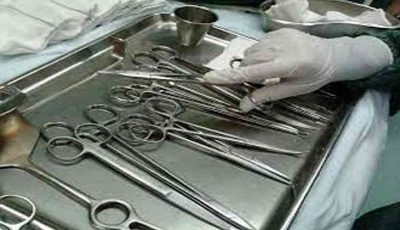- Home
- Editorial
- News
- Practice Guidelines
- Anesthesiology Guidelines
- Cancer Guidelines
- Cardiac Sciences Guidelines
- Critical Care Guidelines
- Dentistry Guidelines
- Dermatology Guidelines
- Diabetes and Endo Guidelines
- Diagnostics Guidelines
- ENT Guidelines
- Featured Practice Guidelines
- Gastroenterology Guidelines
- Geriatrics Guidelines
- Medicine Guidelines
- Nephrology Guidelines
- Neurosciences Guidelines
- Obs and Gynae Guidelines
- Ophthalmology Guidelines
- Orthopaedics Guidelines
- Paediatrics Guidelines
- Psychiatry Guidelines
- Pulmonology Guidelines
- Radiology Guidelines
- Surgery Guidelines
- Urology Guidelines
Sterilization deficiency reportedly exposes more than 1000 patients to HIV

An error in a sanitizing procedure exposed thousands of patients admitted in Goshen Hospital, US, to HIV, hepatitis B, and hepatitis C, according to recent news reports. Due to which, a lawsuit was filed against the hospital on behalf of a patient.
In the lawsuit, the patient references a letter sent out by the hospital to a total of 1,182 surgical patents earlier this month who may have been exposed to a variety of serious diseases, such as hepatitis and HIV, as a result of the sterilization issue.
Both hepatitis B and hepatitis C are liver infections caused by a virus that can be transmitted through blood, as can happen when people share needles. For some people, hepatitis B and C are short-term illnesses and symptoms resolve quickly, but for others, the illnesses become chronic and lead to more serious health issues, according to the Centers for Disease Control and Prevention (CDC). Symptoms of hepatitis B can include fever, fatigue, and yellowing of the eyes, while symptoms of hepatitis C — if patients have any at all — are typically mild and resemble the flu; these can include sore muscles and tiredness.
HIV is a virus that can also be spread through blood and other bodily fluids and that slowly attacks the immune system, destroying the body's defenses such that it can't fight off disease, according to the CDC.
According to the reports, surgical sterilization technicians skipped one step in a multistep cleaning process for certain surgical instruments, that could have possibly contaminated the instruments.
Though those surgical instruments still went through other disinfection and sterilization procedures with a "wide margin of safety," it's not clear if the instruments were completely sterile before they were used onpeople, the hospital statement said. "Even though we believe the risk to be extremely low, out of an abundance of caution, we are offering patients free testing for these viruses," hospital representatives wrote in the statement. Officials from Goshen Hospital sent out notification letters and are offering free blood draws for the 1,182 patients who underwent surgery and who might have been exposed to these infectious diseases.
"As with any patient safety concern, we rigorously investigated all aspects around the incident," Dr. Daniel Nafziger, Goshen hospital chief medical officer, said in the statement. "We have put strict policies and additional safety measures in place to ensure it does not happen again."

Disclaimer: This site is primarily intended for healthcare professionals. Any content/information on this website does not replace the advice of medical and/or health professionals and should not be construed as medical/diagnostic advice/endorsement or prescription. Use of this site is subject to our terms of use, privacy policy, advertisement policy. © 2020 Minerva Medical Treatment Pvt Ltd